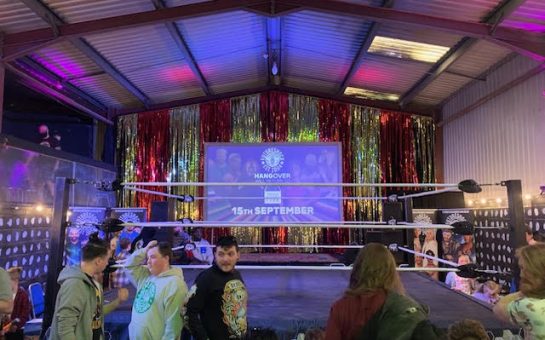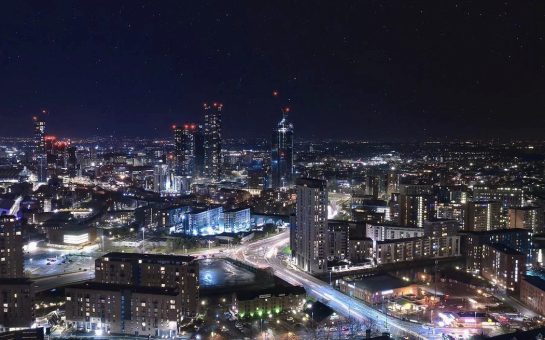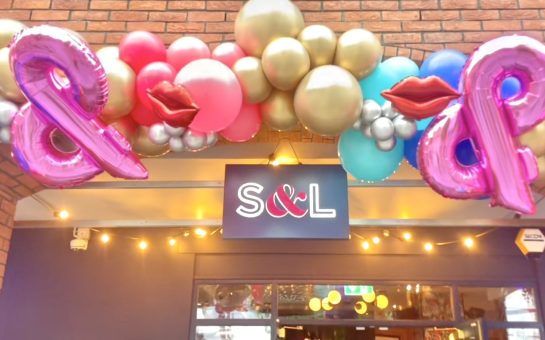In 1955, at the Six Gallery in San Francisco, Allen Ginsberg gave the first public reading of his epic poem Howl.
At the time few people would have predicted that the poem would survive the scrutiny of a widely publicised obscenity trial and go on to make Ginsberg perhaps the most widely recognised and celebrated poet of the post-war generation.
On October 10, The Wonder Inn in Manchester played host to Still Howling, a celebration of the 60th anniversary of this monumental literary event.
Close friends of the poet gathered with experts and enthusiasts for a day of spoken word, discussion and music that demonstrated the lasting impact of Ginsberg’s literary contribution.
Up and running at @StillHowling pic.twitter.com/TcSOnH0Tvw
— Route (@Route_News) October 10, 2015
The Wonder Inn proved to be the perfect place to host such an event due to its uncanny similarity to the spirit of the Six Gallery itself.
Organiser Simon Warner, author and Leeds University Lecturer, said of the choice of venue: “The Six Gallery was a reclaimed auto workshop, a reclaimed industrial space.
“I feel that a resurrection has gone on in this building – it’s an old, historic, industrial place and it’s now being used for the arts, and tonight for poetry.
“I think for tonight there is an echo of that spirit.”
The fact that this echo of spirit was recognised by those who had spoken to Ginsberg about the original reading is testament to the success in venue selection.
Famous Beat poet and publisher Michael Horowitz, a close friend of Ginsberg, said of the event: “It was far closer to what I intimate as the spirit of Six Gallery as I could have dreamed up or of.”
It was this insider knowledge – the close friends and experts who were able to verify this comparison being present – that would prove to be the stand-out element to the day.
Proceedings kicked off with co-organiser Roger Bygott introducing the panel which included Beat writers Horowitz and Barry Miles, along with Peter Hale of the Allen Ginsberg Trust and Andrew Barker of the University of Liverpool.
Enlightening discussions of Ginsberg’s legacy followed, with the audience free to contribute thoughts and questions.
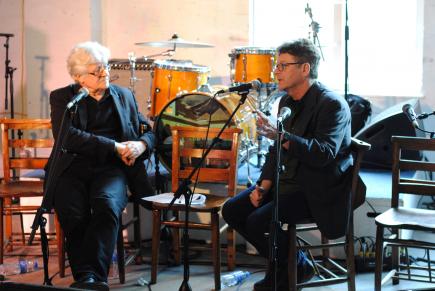
Particularly valuable was the fact that personal anecdotes from those who knew Ginsberg punctuated the more academic discussion, ensuring that the tone remained conversational and accessible.
Barry Miles remembered Ginsberg’s wilfulness to settle into his appointed role as a counter-cultural guru, recalling that ‘a lot of it was playful, there was always that side to him’.
Horowitz, however, shed light on the more troubled side to the poet and his ‘chameleonic personality’’
He highlighted Ginsberg’s struggles as a homosexual in a society where it was criminal to be so and suggested that ‘Allen was smitten with shame, to an extent’ when asked about the poet’s struggles with his parents’ disapproval of his work.
A talk from Bygott about Ginsberg’s singular visit to and performance in Manchester followed, which included readings from personal letters sent in from attendees at this little-reported cultural landmark.
A highlight of the event was the presence of Steven Taylor – the guitarist who worked with Ginsberg throughout the last 20 years of his life.
Through both answering questions during an interview with Miles, and performing musical pieces alone and with Horowitz, Taylor gave everybody a real insight into what it was like to work with Ginsberg.
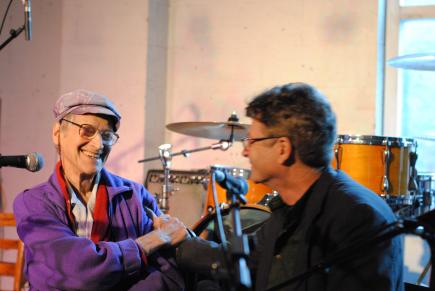
There is always a risk that events such as this – that celebrate the influence of a historic piece of culture – can be entirely nostalgic, lacking relevance in the contemporary period.
Given Ginsberg and the Beats were so supportive of new and underground writing, it would have been a particular shame if an event celebrating his legacy was focused purely on the past.
Fortunately the presence of spoken-word performances from young, underground poets ensured that this was not the case.
Manchester-based performance poet Elmi Ali opened this section of the day, followed by poet and writer Ben Graham.
Both poets were politically relevant and their pieces confirmed the lasting influence of Ginsberg in the way they were written and performed.
The contemporary feel of the event continued with the presence of The Reclaim Voices and Christina Fonthes, who confronted issues of racism in the UK, using real-life examples such as the death of Stephen Lawrence as the basis for their work.
Throughout the readings from the younger poets, the veterans looked on approvingly and showed that the passion for new underground writing that was prevalent among the early beats is still very much alive.
Horowitz brought the readings to a close with a selection of his own works being read alongside those of others he has supported through his long established New Departures project.
The real triumph of Still Howling was its success in combining the old and the new.
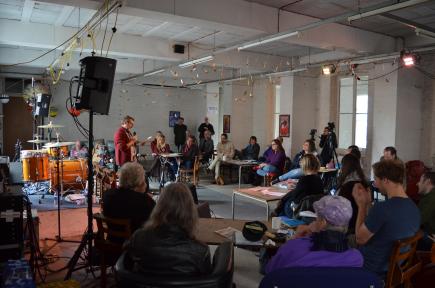
A longing for the past coupled with a desire for creative progressivism meant that a prevalent dichotomy existed within the work of Ginsberg and the Beat poets.
Traditional American ideals of discovery and survival lived in the poetry alongside a use of language and form that sought to reject the tired influences of past generations.
It is only fitting, then, that an event celebrating the longevity of the influence of Ginsberg’s Howl evoked in equal measure an appreciation for the past and an excitement for the future.
Still Howling achieved this without question; those involved ensured the cultural importance of Howl continues to be recognised and enjoyed.
Images courtesy of John Lynch, with thanks
